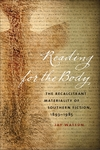Glynn, Karen Marie
Description
The cultural values of white planters and the African-American community converged during the public performance of mule racing in the Mississippi Delta. Afraid of being humiliated in public by unskilled black riders representing their plantations on unpredictable mules, planters spent time and money to find fast mules and talented hostlers. The planters' overt behavior acknowledging skilled African-American hostlers transcended the Sambo-style stereotype of mule racing promoted by the white community. Thus, they temporarily allied their values with those of the African-American community, which interpreted the races as a celebration of the skills of black farm hands. This research paper pieces together the relatively unknown story of mule racing in the Mississippi Delta towns of Greenwood and Rosedale during the 1930s and 1940s. This historical record of Delta society in the pre-World War II era provides a previously unavailable text for analysis and interpretation. Motion picture footage allows viewers to see what the races actually looked like; it answers logistical questions about the number of animals that ran in a race, the number of individual races that comprised an event, and the size and composition of the crowd. The use of home movie footage as an historical document evokes numerous questions. This paper examines authorship, social position, the filmmakers agenda, and the representation of African-Americans.
Text
Application/Pdf
1995 05 01 T07:00:00 Z
http://creativecommons.org/licenses/by-nc-nd/4.0/
















